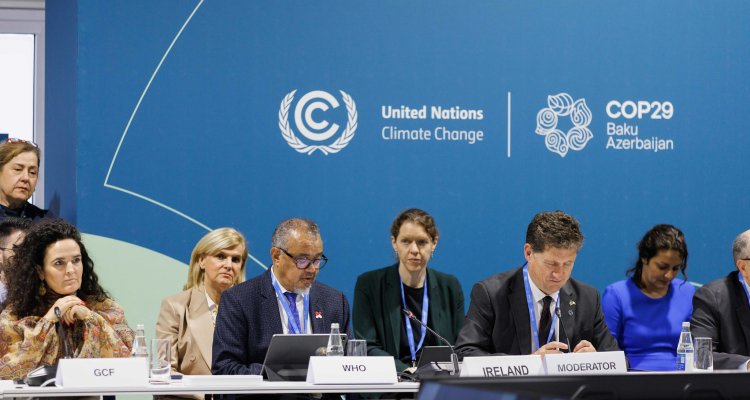
News
Meanwhile at the climate conference: selecting adaptation indicators in a political minefield
The international climate conference COP29 is taking place in Baku, Azerbaijan from 11 to 22 November. At this conference, countries will negotiate about, among other things, the selection of indicators to track progress towards achieving the global goal on adaptation. Wageningen PhD student Emilie Broek is closely following these highly political negotiations.
Her supervisor, Robbert Biesbroek, professor at the Public Administration and Policy group, is in the ‘technical expert group’, a group compromising 78 experts from across the globe that have been tasked with reviewing no fewer than 5,500 indicators submitted by stakeholders, as well as an additional 5,000 gathered by the UN Adaptation Committee. These experts will refine the list to support the negotiators in selecting the final set of indicators.
A political minefield
The experts will also map out the submitted indicators against the 7 thematic targets that were set at the previous COP in the areas of water, agriculture, food security, poverty reduction, ecosystems and biodiversity, among others. There are also four targets in the field of adaptation policy. Biesbroek: ‘For example, has an adaptation strategy been formulated and have measures been taken? And do these measures ensure that countries can achieve the goals? Parties want indicators for that.’
The selection of indicators is a politically sensitive process. That is why Biesbroek, as a member of the expert group, wisely keeps silent about the political weighting of indicators. Broek however is doing her PhD research into the political interests, motivations and preferences behind the adaptation indicators. ‘These indicators can have important roles in setting the global agenda for adaptation, what gets focused on, and what eventually gets acted upon’, says Broek.
Means of implementation as an indicator
A highly sensitive aspect in Baku is whether and how to include ‘means of implementation’ into the selection of indicators. On the one side, many developing countries argue for the inclusion of means of implementation, particularly climate finance in the set of adaptation indicators, as they are considered critical for accelerating meaningful action. These ‘means’ also refer to technology transfer and capacity building needed for implementation of the climate policies. While on the other hand, many developed countries argue that climate finance in particular should be discussed in other fora, and not in relation to indicators tracking progress on adaptation. Broek: ‘This will be a political point of contestation to watch out for during this COP.’
Another point of discussion is: do they want global indicators for global goals or can countries also opt for national goals and indicators? There is debate about this, as well as whether the indicators can be used to compare the performance of countries. After extensive deliberations in the past, it was decided that the indicators should be relevant, but should not be used for comparison.
The technical expert group must navigate this political minefield. The experts have assessed the list of indicators for relevance and that selection is now being put forward into the negotiations. These are very complex negotiations, in which Broek analyses in particular the political interests behind the input of the participants. ‘It is important to understand the politics behind so-called technical indicators, because countries have interests, and every indicator has a political story behind it.’ The indicators are expected to be finalised and selected next year, at the next COP in Brazil.